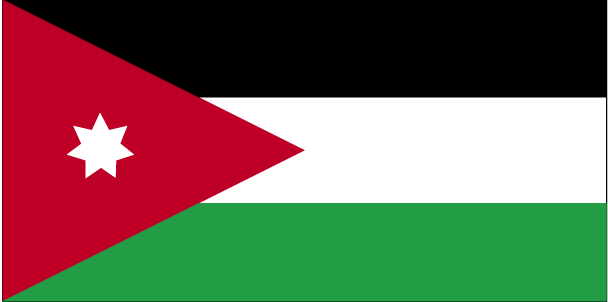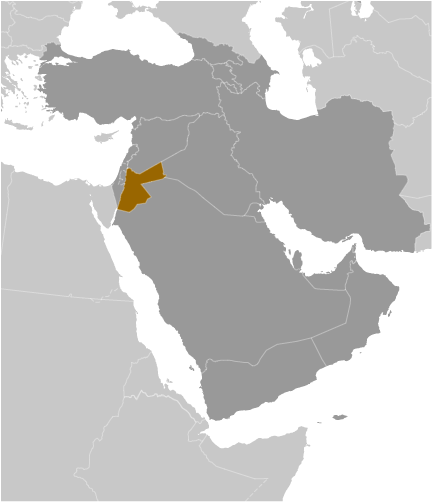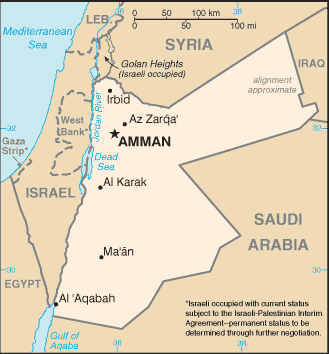Following World War I and the dissolution of the Ottoman Empire, the UK received a mandate to govern much of the Middle East. Britain separated out a semi-autonomous region of Transjordan from Palestine in the early 1920s, and the area gained its independence in 1946; it adopted the name of Jordan in 1950. The country's long-time ruler was King HUSSEIN (1953-99). A pragmatic leader, he successfully navigated competing pressures from the major powers (US, USSR, and UK), various Arab states, Israel, and a large internal Palestinian population. Jordan lost the West Bank to Israel in the 1967 war and barely managed to defeat Palestinian rebels who threatened to overthrow the monarchy in 1970. King HUSSEIN in 1988 permanently relinquished Jordanian claims to the West Bank. In 1989, he reinstituted parliamentary elections and initiated a gradual political liberalization; political parties were legalized in 1992. In 1994, he signed a peace treaty with Israel. King ABDALLAH II, the son of King HUSSEIN, assumed the throne following his father's death in February 1999. Since then, he has consolidated his power and undertaken an aggressive economic reform program. Jordan acceded to the World Trade Organization in 2000, and began to participate in the European Free Trade Association in 2001. In 2003, Jordan staunchly supported the Coalition ouster of Saddam in Iraq and following the outbreak of insurgent violence in Iraq, absorbed thousands of displaced Iraqis. Municipal elections were held in July 2007 under a system in which 20% of seats in all municipal councils were reserved by quota for women. Parliamentary elections were held in November 2007 and saw independent pro-government candidates win the vast majority of seats. In November 2009, King ABDALLAH exercised his constitutional authority to dissolve parliament and called for new elections. Separately, he dismissed the government and appointed a new prime minister and cabinet in December 2009. The King charged the new government with conducting elections before the end of 2010 as well as instituting economic and political reforms.
Country Name
Conventional long form:Hashemite Kingdom of Jordan
Conventional short form:Jordan
Local long form:Al Mamlakah al Urduniyah al Hashimiyah
Local short form:Al Urdun
Former:Transjordan
Government Type
constitutional monarchy
Capital
Name:Amman
Geographic coordinates:31 57 N, 35 56 E
Time difference:UTC+2 (7 hours ahead of Washington, DC during Standard Time)
daylight saving time: +1hr, begins last Friday in March; ends last Friday in October
Administrative divisions
12 governorates (muhafazat, singular - muhafazah); Ajlun, Al 'Aqabah, Al Balqa', Al Karak, Al Mafraq, 'Amman, At Tafilah, Az Zarqa', Irbid, Jarash, Ma'an, Madaba
Independence
25 May 1946 (from League of Nations mandate under British administration)
National Holiday
Independence Day, 25 May (1946)
Constitution
1 January 1952; amended many times
Legal system
based on Islamic law and French codes; judicial review of legislative acts in a specially provided High Tribunal; has not accepted compulsory ICJ jurisdiction
Suffrage
18 years of age; universal
Executive branch
Chief of state:King ABDALLAH II (since 7 February 1999); Crown Prince HUSSEIN (born 28 June 1994), eldest son of King ABDALLAH II
Head of government:Prime Minister Samir al-RIFAI (since 9 December 2009)
Cabinet:Cabinet appointed by the prime minister in consultation with the monarch
(For more information visit the World Leaders website)
Elections:the monarchy is hereditary; prime minister appointed by the monarch
Legislative branch
bicameral National Assembly or Majlis al-'Umma consists of the Senate, also called the House of Notables or Majlis al-Ayan (55 seats; members appointed by the monarch to serve four-year terms) and the Chamber of Deputies, also called the House of Representatives or Majlis al-Nuwaab (110 seats; members elected using a single, non-transferable vote system in multi-member districts to serve four-year terms); note - 6 seats are reserved for women, 9 seats are reserved for Christian candidates, 9 seats are reserved for Bedouin candidates, and 3 seats are reserved for Jordanians of Chechen or Circassian descent
Elections:Chamber of Deputies - last held on 20 November 2007 (next scheduled to be held in 2011); note - a royal decree was issued to dissolve the Chamber of Deputies, effective 24 November 2009; no date announced for early elections
Election results:Chamber of Deputies - percent of vote by party - NA; seats by party - IAF 6, independents and other 104; note - seven women serve in the Assembly, six of whom filled women's quota seats and one was directly elected
Judicial branch
Court of Cassation (Supreme Court)
Political Parties and Leaders
Arab Ba'ath Socialist Party [Fuad DABBOUR]; Ba'ath Arab Progressive Party [Tayseer al-HAMSI]; Call Party [Mohammed Abu BAKR]; Democratic People's Party [Ahmad Yusuf 'ALIYA]; Democratic Popular Unity Party [Sa'ed DIAB]; Islamic Action Front or IAF [Ishaq al-FARHAN]; Islamic Center Party [Marwan al-FA'OURI; Jordanian Communist Party [Munir HAMARNEH]; Jordanian National Party [Mona Abu BAKR]; Jordanian United Front [Amjad al-MAJALI]; Life Party [Thaher 'AMROU]; Message Party [Hazem QASHOU]; National Constitution Party [Ahmed al-SHUNAQ]; National Movement for Direct Democracy [Mohammed al-QAQ]
Political pressure groups and leaders
Anti-Normalization Committee [Ali Abu SUKKAR, president vice chairman]; Jordan Bar Association [Saleh al-ARMUTI, chairman]; Jordanian Press Association [Sayf al-SHARIF, president]; Jordanian Muslim Brotherhood [Dr. Hamam SAID, controller general]
International organization participation
ABEDA, AFESD, AMF, CAEU, CICA, FAO, G-77, IAEA, IBRD, ICAO, ICC, ICCt, ICRM, IDA, IDB, IFAD, IFC, IFRCS, ILO, IMF, IMO, Interpol, IOC, IOM, IPU, ISO, ITSO, ITU, ITUC, LAS, MIGA, MINURSO, MINUSTAH, MONUC, NAM, OIC, OPCW, OSCE (partner), PCA, UN, UNAMID, UNCTAD, UNESCO, UNHCR, UNIDO, UNMIL, UNMIS, UNOCI, UNRWA, UNWTO, UPU, WCO, WFTU, WHO, WIPO, WMO, WTO
Diplomatic representation in the US
Chief of mission:Ambassador ZEID Ra'ad Zeid al-Hussein, Prince
Chancery:3504 International Drive NW, Washington, DC 20008
Telephone:[1] (202) 966-2664
FAX:[1] (202) 966-3110
Diplomatic representation from the US
Chief of mission:Ambassador Robert S. BEECROFT
Embassy:Abdoun, Amman
Mailing address:P. O. Box 354, Amman 11118 Jordan; Unit 70200, Box 5, DPO AE 09892-0200
Telephone:[962] (6) 590-6000
FAX:[962] (6) 592-0121
Flag description
three equal horizontal bands of black (top), representing the Abbassid Caliphate, white, representing the Ummayyad Caliphate, and green, representing the Fatimid Caliphate; a red isosceles triangle on the hoist side, representing the Great Arab Revolt of 1916, and bearing a small white seven-pointed star symbolizing the seven verses of the opening Sura (Al-Fatiha) of the Holy Koran; the seven points on the star represent faith in One God, humanity, national spirit, humility, social justice, virtue, and aspirations; design is based on the Arab Revolt flag of World War I










